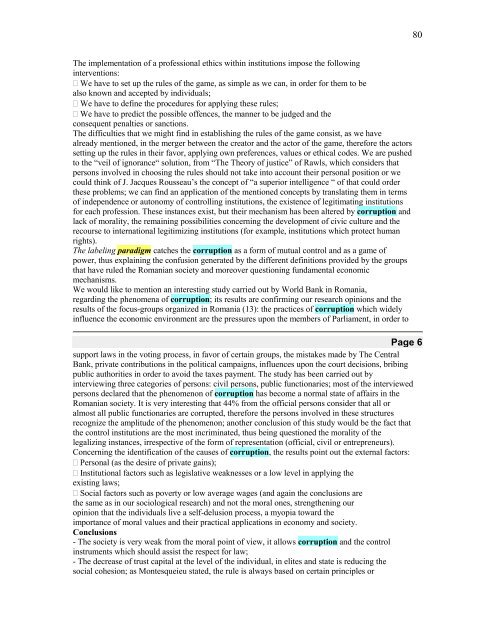FILSAFAT KORUPSI - Direktori File UPI
FILSAFAT KORUPSI - Direktori File UPI
FILSAFAT KORUPSI - Direktori File UPI
Create successful ePaper yourself
Turn your PDF publications into a flip-book with our unique Google optimized e-Paper software.
The implementation of a professional ethics within institutions impose the following<br />
interventions:<br />
We have to set up the rules of the game, as simple as we can, in order for them to be <br />
also known and accepted by individuals;<br />
We have to define the procedures for applying these rules;<br />
We have to predict the possible offences, the manner to be judged and the<br />
consequent penalties or sanctions.<br />
The difficulties that we might find in establishing the rules of the game consist, as we have<br />
already mentioned, in the merger between the creator and the actor of the game, therefore the actors<br />
setting up the rules in their favor, applying own preferences, values or ethical codes. We are pushed<br />
to the “veil of ignorance“ solution, from “The Theory of justice” of Rawls, which considers that<br />
persons involved in choosing the rules should not take into account their personal position or we<br />
could think of J. Jacques Rousseau‟s the concept of “a superior intelligence “ of that could order<br />
these problems; we can find an application of the mentioned concepts by translating them in terms<br />
of independence or autonomy of controlling institutions, the existence of legitimating institutions<br />
for each profession. These instances exist, but their mechanism has been altered by corruption and<br />
lack of morality, the remaining possibilities concerning the development of civic culture and the<br />
recourse to international legitimizing institutions (for example, institutions which protect human<br />
rights).<br />
The labeling paradigm catches the corruption as a form of mutual control and as a game of<br />
power, thus explaining the confusion generated by the different definitions provided by the groups<br />
that have ruled the Romanian society and moreover questioning fundamental economic<br />
mechanisms.<br />
We would like to mention an interesting study carried out by World Bank in Romania,<br />
regarding the phenomena of corruption; its results are confirming our research opinions and the<br />
results of the focus-groups organized in Romania (13): the practices of corruption which widely<br />
influence the economic environment are the pressures upon the members of Parliament, in order to<br />
Page 6<br />
support laws in the voting process, in favor of certain groups, the mistakes made by The Central<br />
Bank, private contributions in the political campaigns, influences upon the court decisions, bribing<br />
public authorities in order to avoid the taxes payment. The study has been carried out by<br />
interviewing three categories of persons: civil persons, public functionaries; most of the interviewed<br />
persons declared that the phenomenon of corruption has become a normal state of affairs in the<br />
Romanian society. It is very interesting that 44% from the official persons consider that all or<br />
almost all public functionaries are corrupted, therefore the persons involved in these structures<br />
recognize the amplitude of the phenomenon; another conclusion of this study would be the fact that<br />
the control institutions are the most incriminated, thus being questioned the morality of the<br />
legalizing instances, irrespective of the form of representation (official, civil or entrepreneurs).<br />
Concerning the identification of the causes of corruption, the results point out the external factors:<br />
Personal (as the desire of private gains);<br />
Institutional factors such as legislative weaknesses or a low level in applying the <br />
existing laws;<br />
Social factors such as poverty or low average wages (and again the conclusions are <br />
the same as in our sociological research) and not the moral ones, strengthening our<br />
opinion that the individuals live a self-delusion process, a myopia toward the<br />
importance of moral values and their practical applications in economy and society.<br />
Conclusions<br />
- The society is very weak from the moral point of view, it allows corruption and the control<br />
instruments which should assist the respect for law;<br />
- The decrease of trust capital at the level of the individual, in elites and state is reducing the<br />
social cohesion; as Montesqueieu stated, the rule is always based on certain principles or<br />
80

















